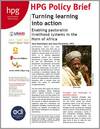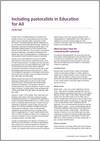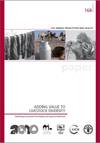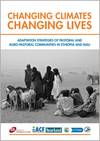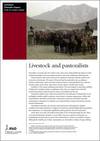This policy brief argues the need for national strategies to guide development actors and help enhance the impact of aid interventions. There is also a need to close the gap between the theory and practice of pastoral development by supporting longer-term investments and programme strategies, ensuring that good practices are adopted, and bridging the gap between development and emergency relief efforts.
Year of publication: 2010Organization: Overseas Development Institute (ODI)
Topic: Food security
Language: English
Type of document: Technical, Policies and legislation
Geographical coverage: Eastern Africa
The study explores how strengthening the resilience of African livestock systems to climate change, and making current investments to improve African livestock coping mechanisms, can improve the climate resilience of small-holder farmers and pastoralists. The study was implemented in 2009 through two sub-regional reviews (one in eastern and southern Africa, the second in West and Central Africa), six country visits (Kenya, Namibia, Malawi, Cameroon, Niger and Mali), and an e-conference.
Year of publication: 2010Organization: International Union for Conservation of Nature (IUCN)
Topic: Climate change, Food security, Innovation, Resilience
Language: English
Type of document: Technical, Policies and legislation
Geographical coverage: West Africa, Central Africa, Eastern Africa
There is new interest and willingness to look afresh at how formal schooling can become compatible with pastoralism. It is becoming clear that Education for All requires a re-thinking of how pastoralists make a living and thus how formal education fits. Pastoralism is and will remain the main economic driver in most dryland regions of Africa, and is important also in semi-arid areas and mountainous highland regions in South Asia. This document presents the problem of the school-based model of formal education and discusses inclusive approaches to pastoral education.
Year of publication: 2010Organization: Individual authors
Topic: Education
Language: English
Type of document: Technical
Geographical coverage: Global
Niche marketing can provide opportunities for sustainable production in marginal areas and can improve the livelihoods of livestock keepers and people involved in the processing and trade of products. It may especially benefit women and the poor. It can also be a tool for conserving breeds. This book describes eight cases from Africa, Asia and Latin America where outside interventions have attempted to develop markets for specialty products from local breeds. The book describes various approaches to exploiting a niche market and gives recommendations how to do it.
Year of publication: 2010Organization: Food and Agriculture Organization of the United Nations (FAO), International Union for Conservation of Nature (IUCN), Local Livestock for Empowerment of Rural People (LIFE Network), League for Pastoral Peoples and Endogenous Livestock Development (LPP)
Topic: Economy, Value addition
Language: English, Français, Español
Type of document: Technical
Geographical coverage: Global
This report explores the implications of climate change for pastoralists and agro-pastoralists in Ethiopia and Mali. The focus of the report is on local perceptions of changes in climate shocks and stressors. It examines how people respond to these changes, and what constraints they face. Examining local perceptions and responses to change is important because these can help to identify more precisely what support pastoralists require to strengthen their climate resilience. It will also help identify specific constraints that different actors and groups face, and also uncover a more holistic understanding of adaptation in relation to particular socio-economic, political or historical contexts. Drawing on local perceptions, policy makers will be better informed of the impacts of climate change as they are felt on the ground, the challenges and opportunities that pastoralists face in adjusting their livelihoods, and what further assistance should be provided.
Year of publication: 2010Organization: Individual authors
Topic: Climate change, Food security, Indigenous knowledge, Indigenous peoples, Resilience
Language: English
Type of document: Technical
Geographical coverage: West Africa, Eastern Africa
Today there are nearly 200 million pastoralists in the world generating income where conventional farming is limited or not possible. However, pastoral communities are marginalized and generally not given due consideration in wider socio-political analysis. This brief paper presents new challenges and opportunities for pastoralism and key issues and questions in project design.
Year of publication: 2009Organization: International Fund for Agricultural Development (IFAD)
Topic: Economy, Organization, Participation, Resilience, Value addition
Language: English
Type of document: Technical
Geographical coverage: Global
Equitable and secure access to land is a critical factor for the rural poor, especially livestock owners, who depend on agriculture and animal-related activities for their livelihood. This thematic paper is based on the assumption that secure investments in livestock infrastructure and assets can be encouraged by ensuring equitable and secure access to land, and that this approach will help reduce rural poverty. To this end, it identifies experiences and lessons learnt regarding livestock and land-related issues, drawing on experiences from IFAD development projects and programmes all over the world, with a special focus on Africa. It examines the following interrelated issues: livestock and access to land, access to reliable sources of water, encroachment, land degradation, grazing and mobility.
Year of publication: 2009Organization: International Fund for Agricultural Development (IFAD)
Topic: Economy, Land, Value addition
Language: English
Type of document: Technical
Geographical coverage: North Africa, West Africa, Central Africa, Eastern Africa, Southern Africa
This paper addresses the challenge of educating nomadic peoples in the context of rapid global socio-economic change. First, it maps out the conceptual terrain, analysing the key debates in relation to terms that are often misleadingly used as if they are interchangeable – education, schooling, and learning. Second, the paper reviews successful and innovative approaches to education provision around the world that can inform and inspire new approaches to nomadic education.
Year of publication: 2009Organization: International Institute for Environment and Development (IIED)
Topic: Education
Language: English
Type of document: Scientific
Geographical coverage: Global


